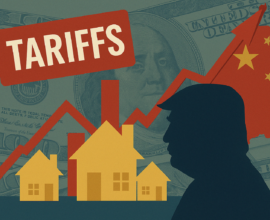10 Ways of Making Your Investments Work for You in 2024
Real estate is a timeless investment because people always need places to live. These assets are useful hedges against inflation and give investors many tax advantages.
However, not all real estate investments work out smoothly. Some investors end up with squatters who don’t pay rent, while others get stuck with fixer-uppers that cost more than anticipated. How can investors navigate these challenges and secure profitable real estate properties? The real estate pros use these top secrets to make successful investments.
1. Know Your Investment Goals
How does buying real estate align with your portfolio? Rental property owners often seek cash flow, while flippers want quick profits. Investors have many goals involving property acquisition, but you should never buy real estate just for the sake of it. Knowing what you want for your portfolio and setting long-term goals can help you determine which real estate assets make sense for you.
Every asset is a risk.
2. Create Investment Criteria
When homeowners look for a new home, they look at the home’s interior, neighborhood, and a few other details. Ultimately, these buyers make their decisions based on whether the home and area are a good place to live. Real estate investors also care about those factors, but they have to weigh additional information. Jamie M. Curtis, Global Real Estate Advisor at Sotheby’s International Realty, suggests looking at several factors before making an offer on a property:
“When I purchase a property, I want to know the cap rate, the nuances of the socioeconomic factors in the area, and the ideal outcome — cash flow, building equity, and realizing appreciation in value.”
That last detail for the ideal outcome goes back to knowing your investment goals. Knowing what you value as an investor and using that as a parameter for your investments can make you more successful.
Some investors also look for commercial investments, such as a new Whole Foods or coffee shop, that demonstrate a growing neighborhood.
3. Diversify Your Investments
Every asset is a risk. Some real estate investments do not yield profits or end up with short-term vacancies. Profitable properties can compensate for one unit’s vacancy. However, it’s more difficult to make your investments work for you if your only property has a vacancy. While that vacancy lasts, you will have to pay an additional mortgage.
Starting with smaller properties and building up can make it easier to diversify your investments. It can be a good idea to look outside of your area if properties are too expensive. It’s easier to diversify your investments if you look at affordable areas and use as much debt as possible to finance the property.
Picking the right type of home can also increase your returns. It’s best to pick a home that doesn’t require too much structural work.
4. Go into Fixer Uppers with Detailed Budgets
Fixer-uppers entice many investors because of the price gap between the fixer-upper and a modern home in the area. While some flippers haul in big profits and it looks easy on TV, fixer uppers are a lot of work and can become costly. Walking into any fixer-upper with a detailed budget can help you gauge the likelihood of the investment becoming profitable.
Curtis recommends overestimating your budget when planning a fixer-upper. Overestimating will give you a better margin of safety and is more realistic than modest expectations.
According to Curtis, “If you are investing in a new market for the first time or in a big market like Southern California, double your budget. I am serious. You need deep pockets to invest in big markets. You need buffer money to offset unexpected expenses and carrying costs. I would advise new investors to start small and familiarize themselves with the remodeling process.”
Picking the right type of home can also increase your returns. It’s best to pick a home that doesn’t require too much structural work.
Curtis also claims, “A budget-friendly strategy is to buy a house that has great bones, solid mechanicals, and just needs cosmetic updates. Paint, flooring, and light fixtures go a long way and are budget-friendly updates that will lure in great tenants.”
If renting makes more sense than buying a home, investors will have an easier time filling up units and raising rent prices over time.
5. Have an Exit Strategy in Place
Exiting an investment allows you to realize capital gains and free up more capital. While exit strategies are integral for a home flipper, it’s also important for rental property investors to create exit strategies.
Investors should assess their property valuations and determine a fair price for selling the asset. An exit strategy may help an investor reduce their portfolios when the market becomes a bubble. Some people hold onto their properties for too long and miss great opportunities to sell.
An exit strategy can also be based on your age and retirement goals. Some investors sell off their rental properties as they get closer to retirement to avoid tenants. Other investors exit out of smaller properties to buy properties with more units to streamline their portfolios.
6. Analyze the Price-to-Rent Ratio
Does it make more sense for someone to buy or rent a home? While the answer depends on your preference, it’s an important question for investors to consider. If renting makes more sense than buying a home, investors will have an easier time filling up units and raising rent prices over time. However, if homes are very affordable, people in the area may prefer to buy a home, forcing landlords to set lower rent prices.
The price-to-rent ratio gives investors a pulse on how people in the area prefer to live. You can arrive at this ratio if you divide the median home price by the median annual rent. For instance, if the median home value is $500,000, and the median annual rent is $25,000, the price-to-rent ratio is 20.
A higher price-to-rent ratio means it is more affordable for people to rent than own homes. Price-to-rent ratios above 10 indicate that it is more economical to rent. However, a price-to-rent ratio below 10 is favorable for people who want to buy a home. Cities have higher price-to-rent ratios than rural areas due to their demand and limited space. The price-to-rent ratio is one of many factors to consider before buying real estate.
Real estate investments are valuable, but having liquid cash to navigate uncertainties and challenges along the way can help preserve your portfolio.
7. Keep an Emergency Fund
Some real estate investors strike gold and buy properties that quickly double in value. These properties can become the linchpins of top-performing portfolios, but falling short on cash can force a sale. Some people overextend themselves and have expenses that exceed rental income. Investors in this situation may have to get rid of profitable assets at discounts.
Riley Neilson, Strategic Real Estate Investment Advisor at Real Estate Bees, recommends having extra cash ready to go in case something changes:
“It’s important to know you can cover emergency expenses if you own the property in your own name, or if you are investing in a fund/syndication to keep at least 10% of your investment amount on hand in case there is a capital call. We have seen capital calls in the past where because the additional capital couldn’t be raised, the loan couldn’t be serviced, and the property was lost back to the bank, along with 100% of the principal those investors placed in it!”
Real estate investments are valuable, but having liquid cash to navigate uncertainties and challenges along the way can help preserve your portfolio.
8. Conduct Due Diligence
Proper due diligence can help you detect problems in a property or feel more confident about an investment. It’s a step every good real estate agent and investor will tell you to follow through with instead of skipping it to save money. Hiring a good inspector is a start, but inspectors focus on the property’s quality. Looking for red flags in a neighborhood can help you identify unfavorable properties and negotiate discounts. Neilson outlined some of the warning signs you may find during your search:
“Things like regular visits by the police, general unrest like loud arguments, even things like a neighboring canal that has a bad smell but only in the evenings…these are all things that can make it more difficult to get and keep good tenants, and can even be used as leverage to negotiate a better price from a seller.”
Holding open dialogue and respecting tenants can prevent small problems from piling up.
9. Hold Open Communication with Tenants
Tenants are a central component of most real estate investing strategies. Tenants pay the monthly rent, which helps the landlord cover the monthly mortgage and other expenses. While tenants can help you acquire more properties, having bad tenants can create the opposite effect.
Keeping effective communication with tenants can minimize the number of setbacks and make real estate investing more enjoyable. Neilson suggests recording communications whenever possible and also has a few other pointers to maintain smooth communication:
“It’s vital to move quickly on repairs. If a repair will take more than 48 hours to resolve, it’s important to just check in with the tenant regularly, even if there isn’t an update, so that they know they’re not forgotten, or worse, attempt the repair on their own! Also, honoring tenant privacy laws is very important, give at least a 24-hour notice when visiting their place of residence.”
Holding open dialogue and respecting tenants can prevent small problems from piling up. Tenants may also be more understanding when it’s necessary to make repairs.
10. Look Beyond Your Backyard
Don’t be afraid to venture out and look at other locations for real estate investments. While you can get started with properties in your location, investors may find more affordable properties in other areas or assets with greater potential. Knowing your criteria can make the transition easier if you decide to look at long-distance properties.








